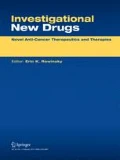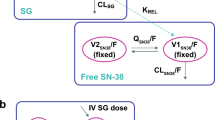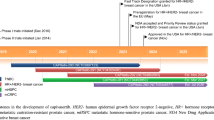Abstract
Purpose: Feverfew is a botanical product that contains parthenolide. Parthenolide has in vitro and in vivo anti-tumor and anti-angiogenic activity. Feverfew has been used extensively without any formal pharmacokinetic analysis. A Phase I trial was conducted to evaluate the pharmacokinetics and toxicity of parthenolide given as a component of “feverfew.” Patients and methods: Feverfew (Tanacet™) was administered as a daily oral tablet in a 28-day cycle. A starting dose of 1 mg per day was explored with subsequent dose escalations to 2, 3, and 4 mg. Assessment of plasma pharmacokinetics was performed on patients accrued to the trial. Solid phase extraction and mass spectroscopy were used to evaluate parthenolide plasma concentrations. The limit of detection for parthenolide in plasma was 0.5 ng/ml. Patients were evaluated for response after every two cycles. Results: Feverfew given on this schedule had no significant toxicity, and the maximum tolerated dose was not reached. When parthenolide was administered at doses up to 4 mg as a daily oral capsule in the feverfew preparation, there was not detectable concentration in the plasma. Because of this, parthenolide pharmacokinetics were not able to be completed. Conclusion: Feverfew, with up to 4 mg of parthenolide, given daily as an oral tablet is well tolerated without dose-limiting toxicity, but does not provide detectable plasma concentrations. Purification of parthenolide for administration of higher doses will be needed.
Similar content being viewed by others
References
Wani MC, Taylor HL, Wall ME, Coggon P, McPhail AT: Plant antitumor agents. VI. The isolation and structure of taxol, a novel antileukemic and antitumor agent from Taxus brevifolia. Journal of the American Chemical Society 93: 2325–2327, 1971
Schiff PB, Fant J, Horwitz SB: Promotion of microtubule assembly in vitro by taxol. Nature 277: 665–667, 1979
Bissett D, Setanoians A, Cassidy J, Graham MA et al.: Phase I and pharmacokinetic study of taxotere (RP 56976) administered as a 24-hour infusion. Cancer Res 53: 523–527, 1993
Hehner SP, Heinrich M, Bork PM et al.: Sesquiterpene lactones specifically inhibit activation of NF-kappa B by preventing the degradation of I kappa B-alpha and I kappa B-beta. J Biol Chem 273: 1288–1297, 1998
Bork PM, Schmitz ML, Kuhnt M et al.: Sesquiterpene lactone containing Mexican Indian medicinal plants and pure sesquiterpene lactones as potent inhibitors of transcription factor NF-kappaB. FEBS Lett 402: 85–90, 1997
Sweeney CJ, Sledge G, Kelich S, Nakshatri P et al.: Parthenolide: A nuclear factor kappaB inhibitor with in vitro anti-angiogenesis and anti-cancer properties. Proceedings of the Am Assoc Cancer Res 2001; A925
Baldini N: Multidrug resistance—A multiplex phenomenon. Nat Med 3: 378–380, 1997
Liotta LA, Steeg PS, Stetler-Stevenson WG: Cancer metastasis and angiogenesis: An imbalance of positive and negative regulation. Cell 64: 327–336, 1991
Wang CY, Mayo MW, Baldwin AS, Jr: TNF-and cancer therapy-induced apoptosis: Potentiation by inhibition of NF-kappaB. Science 274: 784–787, 1996
Patel NM, Nozaki S, Shortle NH, Bhat-Nakshatri P et al.: Paclitaxel sensitivity of breast cancer cells with constitutively active NF-kappaB is enhanced by IkappaB alpha super-repressor and parthenolide. Oncogene 19: 4159–4169, 2000
Makheja AN, Bailey JM: A platelet phospholipase inhibitor from the medicinal herb feverfew (Tanacetum parthenium). Prostaglandins Leukot Med 8: 653–660, 1982
Pugh WJ, Sambo K: Prostaglandin synthetase inhibitors in feverfew. J Pharm Pharmacol 40: 743–745, 1988
Sumner H, Salan U, Knight DW et al.: Inhibition of 5-lipoxygenase and cyclo-oxygenase in leukocytes by feverfew. Involvement of sesquiterpene lactones and other components. Biochem Pharmacol 43: 2313–2320, 1992
Heptinstall S, White A, Williamson L et al.: Extracts of feverfew inhibit granule secretion in blood platelets and polymorphonuclear leucocytes. Lancet 1: 1071–1074, 1985
Vogler BK, Pittler MH, Ernst E: Feverfew as a preventive treatment for migraine: A systematic review. Cephalalgia 18: 704–708, 1998
Murphy JJ, Heptinstall S, Mitchell JR: Randomized double-blind placebo-controlled trial of feverfew in migraine prevention. Lancet 2: 189–192, 1988
Johnson ES, Kadam NP, Hylands DM et al.: Efficacy of feverfew as prophylactic treatment of migraine. Br Med J (Clin Res Ed) 291: 569–573, 1985
Tfelt-Hansen P, Nielsen SL: Patient numbers needed in prophylactic migraine trials. Neuroepidemiology 6: 214–219, 1987
Pattrick M, Heptinstall S, Doherty M: Feverfew in rheumatoid arthritis: A double blind, placebo controlled study. Ann Rheum Dis 48: 547–549, 1989
Sweeney CJ, Gokmen-Polar Y, Murry DJ, Miller KD et al.: Inhibition of angiogenesis by parthenolide: A nuclear factor kappa B inhibitor derived from Tenacetum Partheneum. Proc Am Assoc Cancer Res 2002; A178
Vickers A: Botanical medicines for the treatment of cancer: Rationale, overview of current data, and methodological considerations for phase I and II trials. Cancer Invest 20: 1069–1079, 2002
Burton B: Complimentary medicines industry in crisis after recall of 1546 products. BMJ 326: 1001, 2003
PC-SPES: A cautionary tale. Harv Mens Health Watch 7: 8, 2002
Sovak M, Seligson Al, Konas M et al.: Herbal composition PC-SPES for management of prostate cancer: Identification of active principles. J Natl Cancer Inst 94: 1275–1281, 2002
Author information
Authors and Affiliations
Rights and permissions
About this article
Cite this article
Curry, E.A., Murry, D.J., Yoder, C. et al. Phase I dose escalation trial of feverfew with standardized doses of parthenolide in patients with cancer. Invest New Drugs 22, 299–305 (2004). https://doi.org/10.1023/B:DRUG.0000026256.38560.be
Issue Date:
DOI: https://doi.org/10.1023/B:DRUG.0000026256.38560.be




